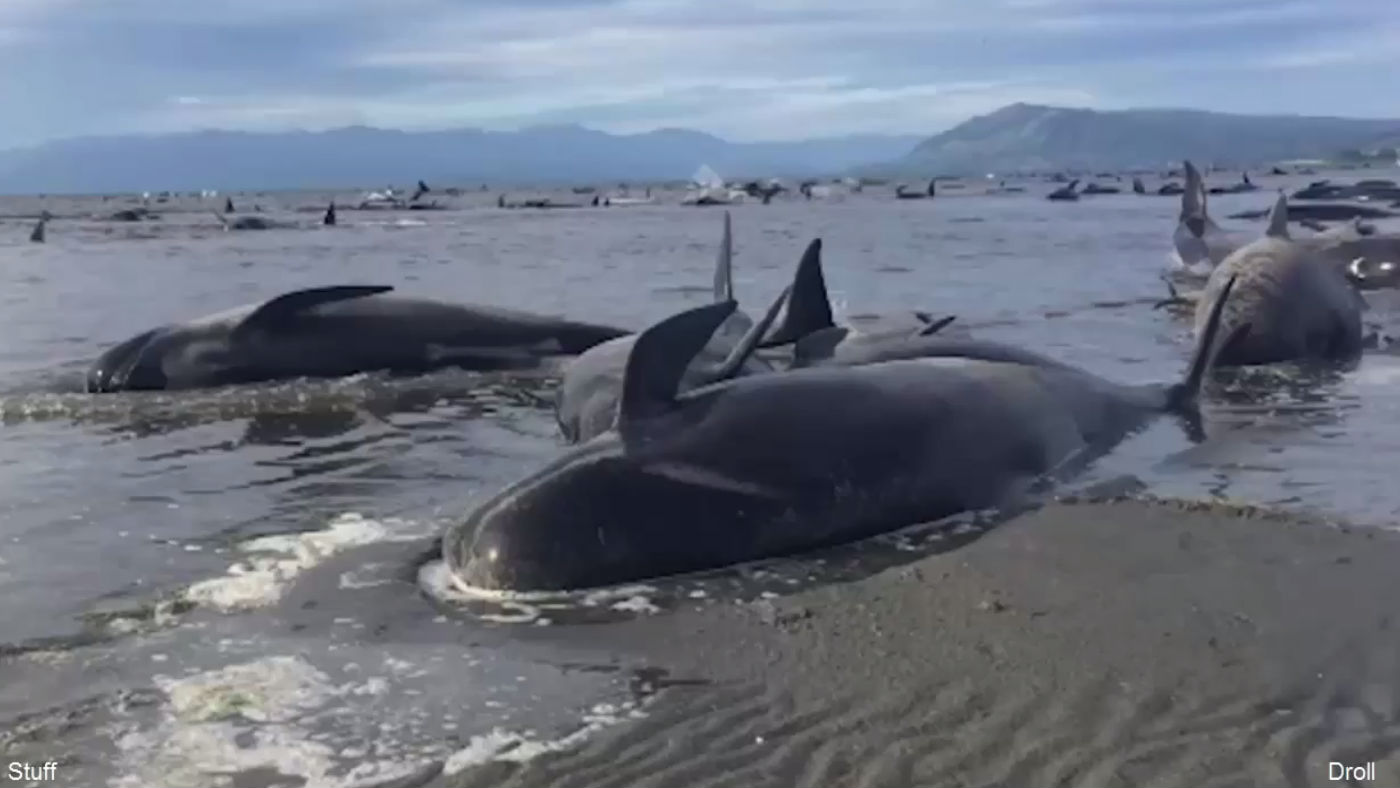Hundreds of whales die in mass stranding on New Zealand beach
Locals urged to volunteer to save surviving pilot whales in one of country's worst beachings

A free daily email with the biggest news stories of the day – and the best features from TheWeek.com
You are now subscribed
Your newsletter sign-up was successful
As many as 300 pilot whales have died after becoming stranded on a New Zealand beach.
Around 416 of the animals, the majority already dead, were found on Farwell Spit, a remote beach on South Island, in the early hours of Friday morning, the Department of Conservation (DoC) said. It is believed to be the largest mass stranding in New Zealand in decades.
Locals were asked to forgo work and school commitments to save the remaining whales, helping to keep the animals wet and calm and attempting to refloat them.
The Week
Escape your echo chamber. Get the facts behind the news, plus analysis from multiple perspectives.

Sign up for The Week's Free Newsletters
From our morning news briefing to a weekly Good News Newsletter, get the best of The Week delivered directly to your inbox.
From our morning news briefing to a weekly Good News Newsletter, get the best of The Week delivered directly to your inbox.
They were successfully refloated at high tide, 10.30am local time, but by the afternoon's low tide, at least half of them had rebeached themselves.
Conservation staff and up to 500 volunteers are now focused on keeping the surviving whales as healthy as possible until high tide on Saturday, says The Guardian.
Reasons for whales beaching themselves are not entirely understood. It is thought that navigational errors are the most common cause, although whales that are sick or injured may purposefully beach themselves.
According to the BBC, a beached whale will often send out a distress signal to the other members of its pod, who then get stranded on the shore as the tide recedes.
A free daily email with the biggest news stories of the day – and the best features from TheWeek.com
Andrew Lamason, DoC operations manager, told the New Zealand Herald some of the whales were looking "very distressed" as many "slowly slipped away".
He also hinted that many of the animals that had returned to the water were behaving irregularly and could rebeach themselves.
"There are about 50 whales offshore," he said. "They're not looking great out there; just milling around."
Staff and volunteers had hoped the whales would turn on the high tide and leave the bay, but are now preparing for further strandings.
-
 What to know before filing your own taxes for the first time
What to know before filing your own taxes for the first timethe explainer Tackle this financial milestone with confidence
-
 The biggest box office flops of the 21st century
The biggest box office flops of the 21st centuryin depth Unnecessary remakes and turgid, expensive CGI-fests highlight this list of these most notorious box-office losers
-
 The 10 most infamous abductions in modern history
The 10 most infamous abductions in modern historyin depth The taking of Savannah Guthrie’s mother, Nancy, is the latest in a long string of high-profile kidnappings
-
 Epstein files topple law CEO, roil UK government
Epstein files topple law CEO, roil UK governmentSpeed Read Peter Mandelson, Britain’s former ambassador to the US, is caught up in the scandal
-
 Iran and US prepare to meet after skirmishes
Iran and US prepare to meet after skirmishesSpeed Read The incident comes amid heightened tensions in the Middle East
-
 Israel retrieves final hostage’s body from Gaza
Israel retrieves final hostage’s body from GazaSpeed Read The 24-year-old police officer was killed during the initial Hamas attack
-
 China’s Xi targets top general in growing purge
China’s Xi targets top general in growing purgeSpeed Read Zhang Youxia is being investigated over ‘grave violations’ of the law
-
 Panama and Canada are negotiating over a crucial copper mine
Panama and Canada are negotiating over a crucial copper mineIn the Spotlight Panama is set to make a final decision on the mine this summer
-
 Why Greenland’s natural resources are nearly impossible to mine
Why Greenland’s natural resources are nearly impossible to mineThe Explainer The country’s natural landscape makes the task extremely difficult
-
 Iran cuts internet as protests escalate
Iran cuts internet as protests escalateSpeed Reada Government buildings across the country have been set on fire
-
 US nabs ‘shadow’ tanker claimed by Russia
US nabs ‘shadow’ tanker claimed by RussiaSpeed Read The ship was one of two vessels seized by the US military